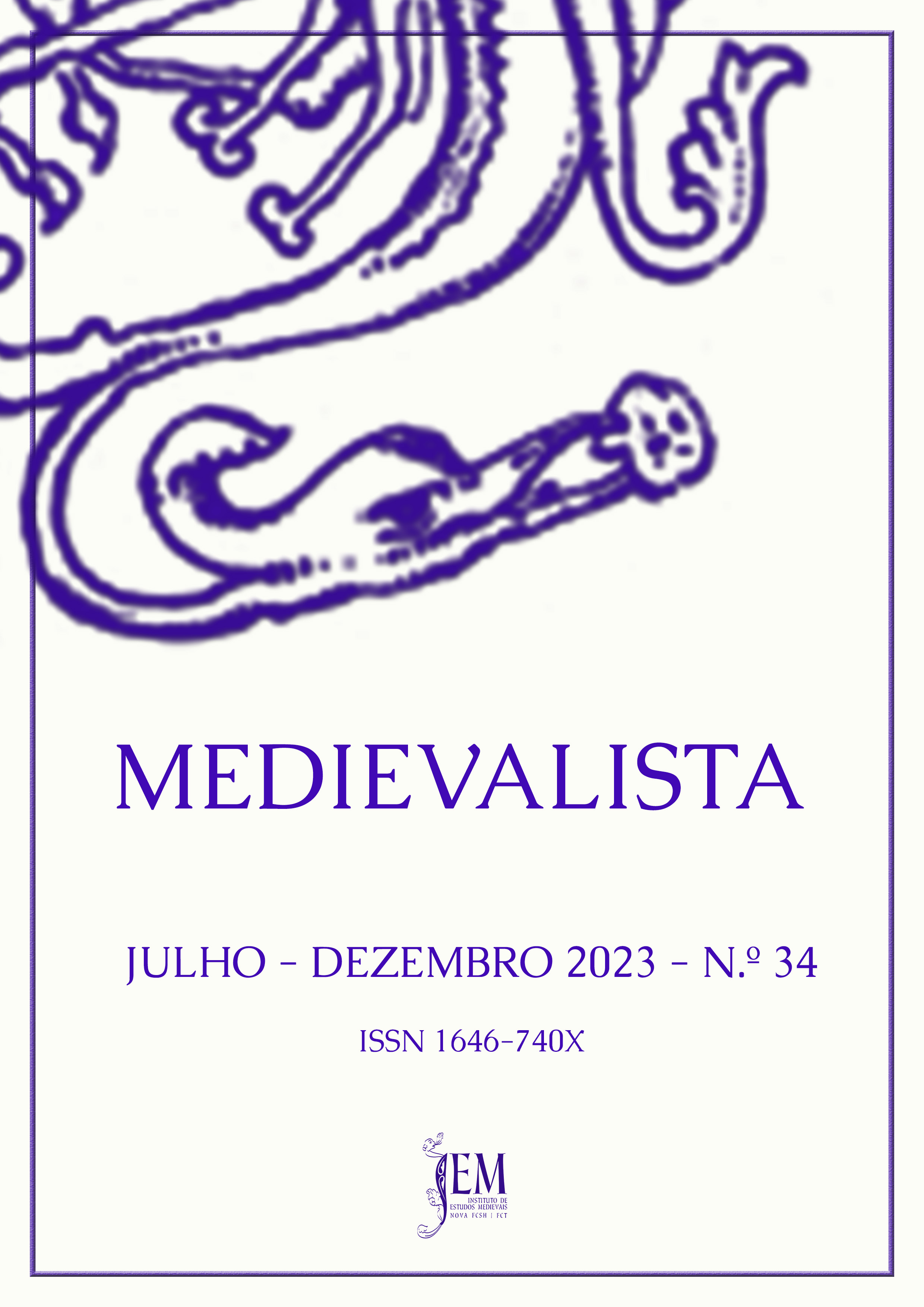The Network behind the Chronicle: William of Andres and the Roots of a Legal Narrative
DOI:
https://doi.org/10.4000/medievalista.6914Keywords:
William of Andres, Thomas of Marlborough, canon law, network theory, medieval chroniclesAbstract
Two chronicles, the Chronicle of Andres and the Chronicle of Evesham, although different from each other in many ways, both contain remarkable first-person singular legal narratives about cases shepherded by their authors through the curia of Innocent III. Although the chronicles share no content, the similarity may be explained by one writer’s influence over the other. The Evesham author, Thomas of Marlborough, had been a student and was an intimate of Stephen Langton; he was also a fellow student of Richard Poore. Andres and Canterbury had long-standing connections, and when William of Andres brought his case to the curia, he was advised by Langton and the monks. Richard Poore heard Andres’s case as a judge-delegate, and was probably responsible for it being returned to the pope for final judgment. The four men came together at the translation of the relics of Thomas Becket in 1220. This network of connections may go a long way to explain how two otherwise unconnected individuals produced such similar legal narratives. In the following period, the professionalization of law precluded the creation of further similar narratives.
Bibliographical references
Printed Sources
FRIEDBERG, Emil Albert (Ed.) – Corpus iuris canonici, vol. 2, Decretalium collectiones. Reprint ed. Graz: Akademische Druck- u. Verlagsanstalt, 1955.
FRIEDBERG, Emil Albert (Ed.) – Quinque compilationes antiquae nec non collectio canonum Lipsiensis. Reprint ed. Graz: Akademische Druck- U. Verlagsanstalt, 1956.
Gallia christiana, in provincias ecclesiasticas distributa: qua series et historia archiepiscoporum, episcoporum et abbatum regionum omnium quod vetus Gallia complectebatur, Vol. 10. Paris: Typographia regia, 1751.
HAIGNERÉ, Daniel – Les chartes de Saint-Bertin d’après le grand cartulaire de Dom Charles-Joseph Dewitte, Vol. 1. Saint-Omer: H. d’Homont, 1886.
HENRY OF HUNGTINGDON. – Historia Anglorum. Ed. and trans. GREENWAY, Diana. Oxford: Clarendon, 1996.
JOCELIN OF BRAKELOND – The Chronicle of Jocelin of Brakelond Concerning the Acts of Asmaon, Abbot of the Monastery of St. Edmund. Ed. and trans. BUTLER, H. E. New York: Oxford University Press, 1949.
MAP, Walter – De Nugis curialium (Courtiers’ Trifles). Ed. and trans. JAMES, M. R.; revised BROOKE, C. N. L. and MYNORS, R. A. B. Oxford: Clarendon, 1983.
ROBERT OF TORIGNY – Chronique de Robert de Torigni, abbé du Mont Saint-Michel. DELISLE, Léopold (Ed.). Vol. 1. Rouen : Le Brument, 1872.
RUSSELL, Josiah Cox; HEIRONIMUS, John Paul - The Shorter Latin Poems of Master Henry of Avranches Relating to England. Reprint ed. Kraus:New York, 1970.
Thomas of Marlborough: History of the Abbey of Evesham. Ed. and trans. J. Sayers and L. Watkiss. Oxford: Clarendon, 2003.
WILLIAM OF ANDRES – The Chronicle of Andres. Trans. L. Shopkow. Washington, DC: Catholic University of America Press, 2017.
WILLIAM OF JUMIÈGES – The Gesta Normannorum ducum of William of Jumièges, orderic Vitalis, ad Robert of Torigni, Vol 1. Ed. and trans. VAN HOUTS, Elisabeth. Oxford: Clarendon, 1992.
Studies
BALDWIN, John W. – Masters, Princes and Merchants: The Social Views of Peter the Chanter and his Circle. Princeton: Princeton University Press, 1970.
BALDWIN, John – “Master Stephen Langton, Future Archbishop of Canterbury: The Paris Schools and Magna Carta.”. English Historical Review Vol. 123, No. 503. Oxford: Oxford University Press, August 2008, pp. 811-846.
BERGER, Roger – “Colligite fragmenta: Deux listes abbatiales revisitées: Ham-en-Artois et Andres (1079-1352)”. Revue du Nord 86 (2004), pp. 605-614.
BOUREAU, Alain – “How Law Came to the Monks: The Use of Law in English Society at the Beginning of the Thirteenth Century”. Past and Present 167 (2000), pp. 29-74.
BRATU, Cristian – “De la grande histoire à l’histoire personnelle: L’émergence de l’écriture autobiographique chez les historians français du Moyen Âge (XIIIe-XVe siècles) ”. Mediaevistik 25 (2012), pp. 85-117.
BRATU, Cristian – ‘Je, auteur de ce livre’: L’affirmation de soi chez les historiens, de l’Antiquité à la fin du Moyen Âge. Leiden: Brill, 2019.
BRUNDAGE, James – The Medieval Origins of the Legal Profession: Canonists, Civilians, and Courts. Chicago: University of Chicago Press, 2008.
COLLINS, Randall – The Sociology of Philosophies: A Global Theory of Intellectual Change. Cambridge, MA: Harvard University Press, 1998.
DAVISON, Kate – “Early Modern Social Networks: Antecedents, Opportunities, and Challenges”. American Historical Review 134:2 (2019), pp. 456-482.
FOREVILLE, Raymonde – Le jubilé de Saint Thomas Becket du XIIIe au XVe siècle (1220-1470). Paris : S.E.V.P.E.N., 1958.
FUHSE, Jan A. – “The Meaning Structure of Social Networks”. Sociological Theory 27:1 (2009), pp. 51-73.
GRANOVETTER, Mark – “The Strength of Weak Ties: A Network Theory Revisited”. Sociological Theory 1 (1983), pp. 201-233.
KEMP, Brian – “God and the King’s Good Servant: Richard Poore, Bishop of Salisbury, 1217-28”. Peritia 12 (1998), pp. 359-78.
KRAAK, Detlev – “Traces of Orality in Written Contexts: Legal Proceedings and Consultations at the Royal Court as Reflected in Documentary Sources from 12th-century Germany”. In JARITZ, Gerhard; RICHTER, Michael (Eds.) – Oral History of the Middle Ages: The Spoken Word in Context. Krems and Budapest: Medium Aevum Quotidianum, 2001, pp. 142-153.
McGUIRE, Brian Patrick – “Friends and Tales in the Cloister: Oral Sources in Caesarius of Heisterbach's Dialogus miraculorum”. Analecta Cisterciensia 36:2 (1980), pp. 167-247.
MISCH, Georg – Geschichte der Autobiographie, vol. 3/2. Das Hochmittelalter im Anfang: Erste Hälfte. Frankfurt: Verlag G. Schulte-Bulmke, 1959.
NICHOLS, John – “A Heated Conversation: Who was Isabel de Aubigny, Countess of Arundel”. In JARITZ, Gerhard; RICHTER, Michael (Eds.) – Oral History of the Middle Ages: The Spoken Word in Context. Krems and Budapest: Medium Aevum Quotidianum, 2001, pp. 117-127.
O’ROURKE, Samuel – “Hagiography and Exemption at Medieval Evesham, 1000-1250”. Mediaeval Studies 75 (2013), pp. 271-305.
PENNINGTON, Kenneth – The Prince and the Law, 1200-1600: Sovereignty and Rights in the Western Legal Tradition. Berkeley: University of California Press, 1993.
RICHTER, Michael – “A Socio-linguistic Approach to the Latin Middle Ages”. Studies in Medieval Language and Culture. Dublin: Four Courts, 1995, pp. 11-23.
SAYERS, Jane – “English Benedictine Monks at the Papal Court in the Thirteenth Century: The Experience of Thomas of Marlborough in a Wider Context”. Journal of Medieval Monastic Studies 2 (2013), pp. 109-130.
SAYERS, Jane – “Procedures of the Courts of the Judges Delegate”. In SAYERS, Jane E. Law and Records in Medieval England: Studies on the Medieval Papacy, Monasteries, and Records. London: Variorum, 1988, II.
SHOPKOW, Leah – “Three Stories About Life Along the Road: The Survival of the Benedictine Monastery of Andres”. Viator 41:2 (2010), pp. 227-256.
SOMERS, Margaret R. – “The Narrative Constitution of Identity: A Relational and Network Approach”. Theory and Society 25:5 (1994), pp. 605-649.
WENDLING, Fabrice – “Des ‘autobiographies’ latines? Essai de réflexion critique”. Revue des études latines 95 (2017), pp. 221-240.
WERNER, Jakob – “Nachlese auf zürcher Handschriften. I”. Neues Archiv der Gesellschaft für Ältere Deutsche Geschichtskunde. Frankfurt: Gesellschaft für Ältere Deutsche Geschichtskunde, 1906, pp. 575-594.
WERNER, Karl Ferdinand – "Andreas von Marchiennes und die Geschichtsschreibung von Anchin und Marchiennes in der zweiten Hälfte des 12. Jahrhunderts". Deutsches Archiv. Munich: Monumenta Germaniae Historica, 1952, pp. 402-463.
WHITE, L. Michael – “Social Networks: Theoretical Orientation and Historical Application”. Semeia 56 (1992), 23-36.
ZAK, Gur – “Modes of Self-Writing from Antiquity to the Later Middle Ages”. In HEXTER, Ralph; TOWNSEND, David, (Eds.). The Oxford Handbook of Medieval Latin Literature. Oxford: Clarendon, 2012, pp. 485-50
Downloads
Downloads
Published
How to Cite
Issue
Section
License
Copyright (c) 2024 Medievalista

This work is licensed under a Creative Commons Attribution 4.0 International License.





















